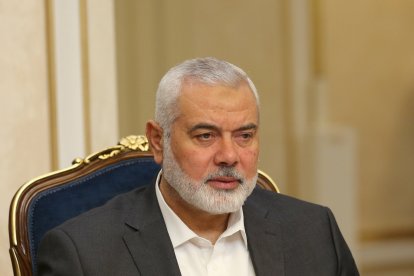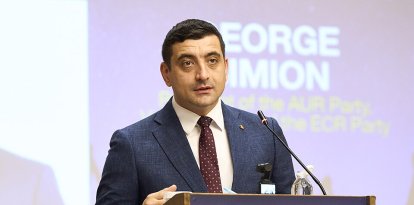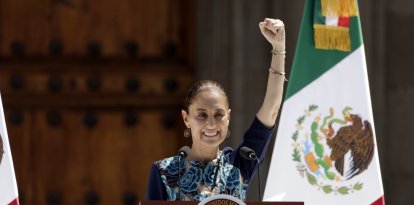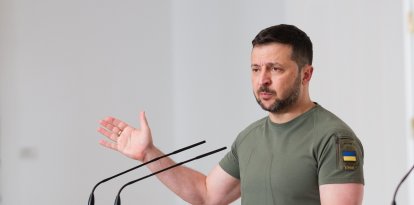Who was Ismail Haniya, the Hamas terrorist leader eliminated in Iran?
He joined the Islamist group in 1987, where 30 years later he rose to the post of head of Hamas' political bureau. He leaves behind a record of savage terrorism against Israelis, a bloody conflict with Palestinian rivals and extreme corruption. His successor has already been chosen.

Ismail Haniya
Ismail Haniya, head of Hamas' political bureau, died Tuesday in an overnight attack in the Iranian capital of Tehran, dealing a hard blow to the terrorist group.
Haniya was killed after participating in the inauguration of Masoud Pezeshkian, Iran's new president. Tehran and Hamas accuse Israel, but so far Jerusalem has not claimed responsibility for the operation.
Haniya was one of the founders of Hamas and had very close ties to Ahmed Yassin, the first leader of the terrorist group who was eliminated by Israel in 2004.
Haniya was born in Shati, a village in the Gaza Strip, to a family that fled a village near the Israeli city of Ashkelon during the War of Independence, which erupted when the armies of Egypt, Jordan, Syria, Lebanon and Iraq invaded Israel in 1948.
Israeli journalist Liam Aviv pointed out in an article in Maariv that in his youth, Haniya worked in Ashkelon as a construction worker.
His academic career was spent at the Islamic University of Gaza, where he studied Arabic literature and was president of the student council.
Haniya joined Hamas during the First Intifada, the violent Palestinian uprising that began in 1987 and ended in 1993, when the terrorist organization was still in the process of being formed.
In 1987, Israel began to pay attention to Haniya as an emerging figure among the ranks of Palestinian terrorism, for which he was placed under administrative detention for six months in an Israeli jail.
In 1989, Haniya served a three-year prison sentence and in 1992 was deported to Lebanon along with 416 other Hamas terrorists. However, he returned to Gaza a year later along with the other members of the Islamist organization who had been deported.
Haniya was appointed head of Yassin's office in 1997 and became the right-hand man of the then- leader of Hamas.
During the Second Intifada, which took place between 2000 and 2005, Haniya's figure gained a lot of strength due to his proximity to Yassin and Israel's elimination of many senior Hamas commanders.
Adiv clarified that, until then, Haniya had not been active in the military wing of Hamas; his power resided mainly in the political arena.
In late 2005, Haniya was elected head of Hamas' list for the January 2006 election, in which the terrorist group defeated Mahmoud Abbas' political rival Fatah and was elected prime minister.
However, since late 2006, a series of bloody battles between Hamas and Fatah ensued, prompting Mahmoud Abbas to announce the dissolution of the unity government and the removal of Haniya as prime minister. Hamas rejected the decision and took control of the Gaza Strip, while Fatah went on to rule only Palestinian localities in the West Bank. Although the conflict officially ended in 2011 and there were some attempts at reconciliation, tensions continue to this day.
Over the years, Haniya survived several assassination attempts and operations and rounds of fighting with the Israeli military.
In 2017, Haniya replaced Khaled Mashaal as head of Hamas' political bureau, and moved from the Gaza Strip to Qatar.
As head of the political bureau, Haniya was one of the main leaders who constructed the terrorist group's strategy, was in charge of foreign relations and fundraising, and carried out important work to influence world public opinion against Israel.
On the day of the Oct. 7 massacre, images were released of Haniya in Turkey, in which he appeared smiling and leading a prayer of thanks alongside other Hamas leaders.
Watch Hamas leader Ismail Haniyeh celebrate & pray as news of their orchestrated massacre & genocide breaks on October 7.
— Goldie Ghamari, MPP | گلسا قمری (@gghamari) October 25, 2023
He's not in Gaza.
Anyone who thinks a ceasefire will save civilian lives does not understand the very real danger of radical fundamentalists & terrorists. https://t.co/qjsCGtC3H4 pic.twitter.com/HFu5fIgbY4
However, Nadiv noted that Haniya was not estimated to have had a major role in planning the Oct. 7 massacre. This assumption is related to the terrorist leader's whereabouts during the attack in southern Israel and to his strained relationship with Mohammed Deif, Hamas' leader in Gaza.
It is also believed that Hamas in Gaza kept the plans in total secrecy and excluded senior commanders in Qatar from planning the attack, Nadiv added.
During the Gaza war, three of Haniya's sons were killed, and his sister, who is married to a Bedouin and resides in Israel, was arrested.
In an interview with a Lebanese outlet in October 2023, less than 20 days after the Oct. 7 massacre, Haniya expressed, "The blood of women, children and the elderly ... it is we who need this blood to awaken in us the revolutionary spirit, to awaken in us the determination."
"The blood of the children, women, and elderly ... we need this blood so it will ignite within us the spirit of revolution."
— Ridvan Aydemir | Apostate Prophet (@ApostateProphet) July 31, 2024
Well. Now it's his blood. pic.twitter.com/I9dZCOVByI
Ismail Haniya's corruption
Haniya has been in the spotlight not only for his terrorism, but for his corruption.
While Gazans were (and are) suffering from poverty and the war initiated by Hamas with the Oct. 7 massacre, and while the terrorist group was (and is) using them as human shields, Haniya lived in luxury in Qatar and Turkey along with other top leaders of the Islamist organization.
According to a report by The New York Post in an article published last November, the three top Hamas leaders alone amassed a staggering net worth of $11 billion.
Hamas has an office in Doha, the capital of Qatar, where Ismail Haniya maintained a lavish lifestyle along with the terror group's other leaders Moussa Abu Marzuk and Khaled Mashaal.
Haniya, a 62-year-old father of 13 children, had a fortune of more than $4 billion, according to German newspaper Bild.
The terrorist leader was photographed with his two adult sons, Maaz and Abdel Salam, in luxury hotels in Qatar and Turkey.
Maaz Haniya is known as the father of Gaza real estate for his collection of houses and buildings and lives in pure luxury in Turkey. He obtained a Turkish passport last year, according to Israeli media.
Khaled Mashaall, Haniya's successor
Khaled Mashaal, 68, was named new head of Hamas' political bureau on Wednesday, Hamas sources said.
Mashaal became Hamas' political leader in exile in 1996 and became known around the world a year later when Israeli agents injected him with poison in a failed assassination attempt in Amman, the capital of Jordan.
The terrorist leader has been a central figure in the Hamas leadership, though he has worked mainly from exile.
The Jerusalem Post indicated that Mashaal's relations with Iran have been strained due to his past support for the 2011 Sunni Muslim-led revolt against Syrian President Bashar al-Assad.
RECOMMENDATION





















